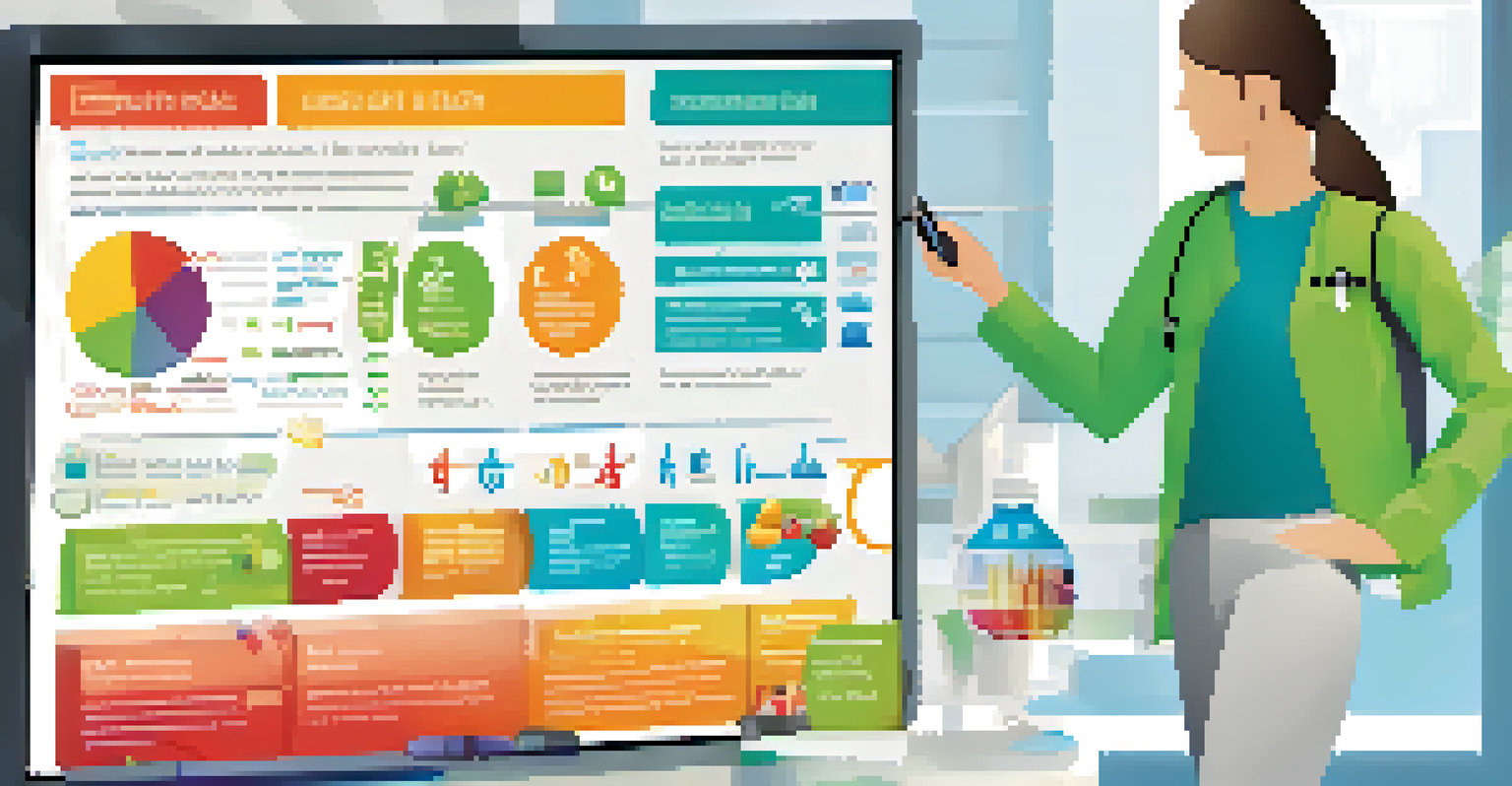The Essential Role of Health Education in Preventive Care

Defining Health Education and Its Importance
Health education is the process of teaching individuals about health-related topics, empowering them to make informed decisions. It serves as a foundation for preventive care by providing knowledge on how to maintain wellness and avoid illnesses. This approach not only enhances individual health but also cultivates healthier communities.
An ounce of prevention is worth a pound of cure.
Through health education, people learn about nutrition, exercise, and disease prevention, which are crucial for a proactive approach to health. For instance, understanding the benefits of a balanced diet can motivate someone to make healthier food choices. This knowledge acts like a guide, steering individuals towards better health practices.
Moreover, effective health education can reduce healthcare costs by preventing chronic diseases. When individuals are educated about risk factors and preventive measures, they are less likely to develop conditions that require extensive medical treatment. Ultimately, this proactive mindset fosters a culture of health that benefits everyone.
The Connection Between Education and Preventive Care
Preventive care focuses on preventing diseases rather than treating them, and health education is integral to this strategy. By understanding risk factors, individuals can take steps to mitigate potential health issues before they arise. This proactive approach leads to a healthier population overall.

For example, regular screenings and vaccinations are vital components of preventive care. Health education plays a crucial role in informing people about the importance of these practices and how they can safeguard their health. When individuals are well-informed, they are more likely to participate in preventive measures.
Importance of Health Education
Health education empowers individuals to make informed decisions about their health, fostering preventive care and healthier communities.
Additionally, health education encourages lifestyle changes that can have a lasting impact. By teaching individuals about the dangers of smoking or the benefits of physical activity, we can inspire them to adopt healthier habits. This shift not only enhances personal well-being but also reduces the burden on healthcare systems.
Tailoring Health Education to Diverse Audiences
One of the challenges of health education is ensuring it resonates with diverse populations. Different age groups, cultures, and socioeconomic backgrounds may require tailored approaches to effectively convey health information. This customization is essential for maximizing understanding and engagement.
The greatest weapon against stress is our ability to choose one thought over another.
For instance, young children might benefit from interactive activities and visuals, while adults may prefer informational seminars or online resources. By adapting the delivery method, we can enhance the learning experience and encourage active participation. This adaptability fosters a deeper connection to health education.
Moreover, addressing cultural beliefs and practices can significantly impact the effectiveness of health education. When educators respect and incorporate local customs, they can break down barriers and improve receptivity. This culturally sensitive approach promotes trust and ultimately leads to better health outcomes.
Utilizing Technology in Health Education
In today's digital age, technology plays a pivotal role in disseminating health education. With the rise of telehealth, online resources, and health apps, individuals have unprecedented access to information. This accessibility empowers them to take charge of their health from the comfort of their homes.
For example, mobile apps can provide personalized health tips based on user data, making education more relevant and engaging. Online platforms also allow for interactive learning experiences, such as webinars and virtual workshops. This tech-savvy approach caters to various learning styles and preferences.
Tailoring Education for All
Customizing health education to diverse audiences ensures better understanding and engagement, leading to improved health outcomes.
However, it’s crucial to ensure that the information shared online is accurate and trustworthy. Educators must guide individuals in discerning credible sources from misinformation. By promoting digital literacy in health education, we can help individuals navigate the vast landscape of health information.
The Role of Healthcare Professionals in Education
Healthcare professionals are instrumental in delivering health education, as they possess the expertise and credibility needed to inform patients. They can provide personalized guidance based on individual health conditions, making the information more applicable. This relationship fosters trust and encourages patients to engage in their health actively.
Furthermore, healthcare providers can identify knowledge gaps and tailor their education efforts accordingly. For instance, a doctor may notice a patient struggling with medication adherence and offer targeted advice on how to manage their routine. This personalized approach enhances patient understanding and compliance.
Additionally, healthcare professionals can advocate for community health education initiatives. By collaborating with local organizations, they can reach broader audiences and emphasize the importance of preventive care. This community engagement amplifies the impact of health education.
Challenges in Implementing Health Education
Despite its undeniable benefits, implementing effective health education can be challenging. Limited resources, time constraints, and varying levels of health literacy can hinder outreach efforts. Recognizing these barriers is the first step toward developing solutions that can enhance health education.
For instance, educators often struggle to find the time to deliver comprehensive health education in busy healthcare settings. By integrating education into routine visits, providers can make the most of limited time. Simple strategies, like providing educational pamphlets or using teach-back methods, can significantly improve understanding.
Role of Technology in Learning
Technology enhances access to health education, allowing personalized learning experiences and promoting digital literacy in navigating health information.
Moreover, addressing health literacy is crucial for successful education. When individuals cannot understand health information, they are less likely to act on it. Simplifying language, using visuals, and ensuring accessibility are key strategies for overcoming this challenge and promoting effective health education.
Measuring the Impact of Health Education
To ensure health education is effective, it’s essential to measure its impact on individual and community health outcomes. By analyzing data on health behaviors, disease prevalence, and patient feedback, educators can gauge the success of their initiatives. This evaluation process is vital for continuous improvement.
For example, if a community program aims to reduce smoking rates through education, tracking changes over time can reveal whether the initiative is working. Understanding the outcomes allows for necessary adjustments to enhance effectiveness. This data-driven approach not only validates the efforts but also helps secure funding for future initiatives.

Additionally, measuring impact can highlight successful strategies that can be replicated in other settings. Sharing success stories and best practices fosters a collaborative environment where health education can thrive. Ultimately, this commitment to assessment ensures that health education remains relevant and impactful.